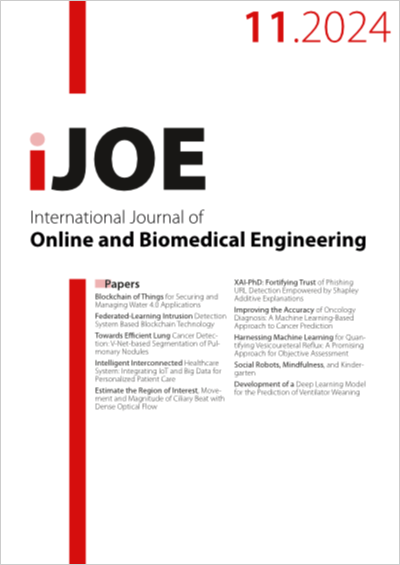Intelligent Interconnected Healthcare System: Integrating IoT and Big Data for Personalized Patient Care
DOI:
https://doi.org/10.3991/ijoe.v20i11.49893Keywords:
Artificial Intelligence, IoT, Big Data, Healthcare Transformation,, Predictive Analytics,, Smart Healthcare SystemsAbstract
This paper introduces the intelligent interconnected healthcare system (IIHS), an innovative fusion of the Internet of Things (IoT) and big data analytics technologies designed to revolutionize proactive and personalized healthcare. IIHS facilitates the integration of real-time data from various devices, ambient sensors, and hospital equipment, creating a continuous stream of comprehensive healthcare data. Leveraging advanced data analysis, IIHS offers actionable insights for ongoing patient health monitoring, trend prediction through machine learning, and rapid information access via a user-friendly interface. The system architecture features a combination of centralized cloud storage and edge storage at healthcare facilities, enhancing both efficiency and security in data management. The effectiveness of IIHS has been demonstrated in two healthcare facilities, which reported significant reductions in patient length of stay and readmission rates. This indicates the system’s potential to improve patient care while seamlessly integrating with existing healthcare infrastructures. IIHS represents the future of digital and personalized medicine, offering a scalable, patient-centric solution that supports the ongoing transformation towards data-driven healthcare.
Downloads
Published
How to Cite
Issue
Section
License
Copyright (c) 2024 Ahmed Abatal, mourad mzili, toufik mzili, Khaoula Cherrat, Asmae Yassine, Laith Abualigah

This work is licensed under a Creative Commons Attribution 4.0 International License.



